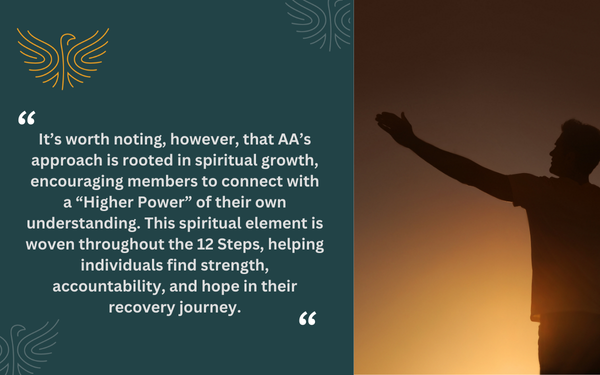AA (Alcoholics Anonymous) is a global fellowship that helps people overcome alcoholism through its twelve-step program. No matter your age, economic status, or education, AA offers a safe space to seek support for alcohol addiction.
The truth is that addiction can be very isolating. But Alcoholics Anonymous offers a supportive, non-judgmental group of peers who understand the struggle firsthand. This sense of belonging further helps reduce shame and builds accountability.
AA also has a structured approach involving 12 steps, which can be beneficial through transition periods or particularly stressful times in life. In this article, we explore AA’s approach further, helping you determine if it's right for you or your loved one.
_______________________________________________________
What Is AA? And What Do They Do?
AA’s primary purpose is to help alcoholics achieve sobriety. Founded in 1935 by Bill Wilson and Dr. Bob Smith, the organization has been helping individuals struggling with alcoholism for over 85 years. Both founders were alcoholics seeking out support. When they discovered their combined mutual support and spiritual approach worked for them, they began to help other alcoholics achieve the same success. And it worked!
The rest is history.
Today, AA is found in over 180 countries worldwide. Anyone who has a desire to stop drinking can join AA. There are no fees, applications, or requirements beyond the desire to stop.
It’s worth noting, however, that AA’s approach is rooted in spiritual growth, encouraging members to connect with a “Higher Power” of their own understanding. This spiritual element is woven throughout the 12 Steps, helping individuals find strength, accountability, and hope in their recovery journey.

_______________________________________________________
What Are AA’s 12 Steps?
AA’s Big Book (which is over 400 pages long) outlines the 12 steps as:
- “We admitted we were powerless over alcohol—that our lives had become unmanageable.
- Came to believe that a Power greater than ourselves could restore us to sanity.
- Made a decision to turn our will and our lives over to the care of God as we understood Him.
- Made a searching and fearless moral inventory of ourselves.
- Admitted to God, to ourselves, and to another human being the exact nature of our wrongs.
- Were entirely ready to have God remove all these defects of character.
- Humbly asked Him to remove our shortcomings.
- Made a list of all persons we had harmed, and became willing to make amends to them all.
- Made direct amends to such people wherever possible, except when to do so would injure them or others.
- Continued to take personal inventory, and when we were wrong promptly admitted it.
- Sought through prayer and meditation to improve our conscious contact with God as we understood Him, praying only for knowledge of His will for us and the power to carry that out.
- Having had a spiritual awakening as the result of these steps, we tried to carry this message to alcoholics, and to practice these principles in all our affairs.”
New members are not required to accept these 12 steps, especially if they are unwilling. However, new members will be asked to maintain an open mind and curiosity about the process. It can sometimes take new members a few meetings of hearing others’ personal experiences to warm up to these 12 steps and begin implementing them.
_______________________________________________________
How AA Meetings Work
AA meetings are typically categorized as either open or closed. Open means that the meeting is available to anyone interested in AA. Closed, in contrast, is for AA members only or those who have a drinking issue. Either way, it’s generally requested in both meetings for everyone to keep any information shared confidential and keep conversation topics revolving around alcohol recovery.
Meetings can also happen in-person or online. In-person meetings are usually in churches, office buildings, recreational halls, or treatment centers. Most of these meetings last around 60 minutes—but some can be 90 or 45 minutes.
There are no fees or dues for these meetings.
However, they often follow these formats:
- Discussion: A leader (or chair) of the group selects topics and decides on the format.
- Speaker: Individual members share their experiences or struggles.
- Beginners: This type of meeting revolves around newcomers.
- Big Book: This involves conversations regarding the 12 Steps.
Post-meeting may involve socialization and snacks, depending on the group. Yet, this time is optional. For newcomers, the meeting itself may be a lot, especially at first, meaning it’s okay to feel you’ve handled all you can for the day (and skip the social part). At the same time, it’s important to keep in mind that this socialization can foster deeper connections, further supporting your recovery journey.
.png)
_______________________________________________________
Does AA Work?
While there is tons of anecdotal evidence, the research is mixed. A 2009 study reported that approximately 50% of individuals who attended AA meetings remained abstinent for one year, as well as at three- and eight-year intervals. On the other hand, only one-fifth of individuals with alcoholism who didn’t attend AA stayed sober.
Either way, the role of community and support in achieving long-term sobriety should never be overlooked. While AA isn’t a one-size-fits-all solution, it has worked for many people. All in all, AA remains a powerful resource for many around the world. If you’re curious to learn more about recovery or the 12 steps, the Freedom Recovery Centers (FRC) is here to help. Our phone lines are open 24/7. Whenever you’re ready, call us at 804-635-3746. Recovery is possible.
.svg)






.svg)

.svg)



.svg)
